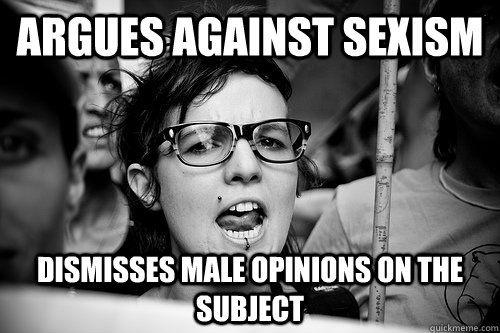Just some observations I've had while arguing about it on the internet, obviously this is IMO:
1. Feminism is the "enemy" [for parts of the internet]. When someone's part of the "enemy", it doesn't matter how reasonable they are or how sensible their arguments – they're bad, stupid and wrong, plain and simple. When you read and respond to someone on the "enemy side", you aren't looking for good points, common ground or to evolve your opinions based on new arguments, you're looking for something to pick apart, expose how flawed and horrible their position is compared to yours, and show how much better you and your team are than them and their team. And, contrariwise, when you read something from someone on "your side", you aren't going to be going out of your way to look for flaws, and if you do see them you'll see it as understandable and doesn't really detract from their and your position being correct. This isn't usually concious, and it's probably because it doesn't feel nice to feel like you could be wrong about something, whereas it feels good to be reinforced in what you think. Much has been made about confirmation bias, but it's not something specific people suffer from (i.e. the "enemy") – everyone has it, and this is it.
That's the problem I have with the "crazy feminists" argument. Sure, there are some really unpleasant feminists. There's also really unpleasant anti-feminists, and unpleasant people in general, everywhere, esp. on the internet. The reason people notice the unpleasant feminists is because they already have a vested interest in finding unpleasant feminists. Feminism gets a bad name from these people not merely because they exist or are vocal, but because people want to find them, talk about them, and give them exposure, as it supports their preconceived notion of feminists being bad.
Also, this sort of thing colours everything, so someone can be fairly reasonable with good, well balanced points, and still come across as one of the "crazies", because everything they say and do is examined in minute detail to find the flaws, exaggerate them, shout them to the rooftops and minimize anything good they've done. Anita Sarkeesian is, IMO, a good example of this. She's not perfect by any means and her work very definitely has room for improvement. But, she's not the second coming of Satan concocting an ingenious and elaborate scheme to strip innocent people out of their money while at the same time being a barely functional meat-head who can barely string two words together let alone make anything close to a good point, either. She's just a normal, human lady, who's making videos about something she wants to make videos about, with all the positives and flaws that a human doing something entails.
But, as she's a feminist, she's already the "enemy", and from there on it just gets worse because now she's the enemy everything about her that isn't perfect (and some things that are outright made up) is going to be picked up and used as evidence that she's bad, stupid, and wrong. The enemy has to be those things – it's the enemy!
2. Feminism is a very complex topic. It's historically been pretty well entwined with academia, and so it involves lots of subtle, nuanced ideas that aren't something you can fit in a caption or a Tweet etc. Since people aren't usually inclined to spend a lot of time researching something (esp. when it's from "the enemy" – who wants to spend time reading stuff you already know is wrong?), they're going to get the wrong end of the stick a lot of the time when these ideas are brought up. This obviously isn't necessarily their fault, because in all seriousness who does have the time to research everything in depth? But by the same token, people who do understand it to some degree can't be expected to educate everyone they meet about the concepts involved, because that would take even more time.
As an example of this: As I understand it, "patriarchy" (a.k.a. kyriarchy for a more intersectional version of the idea) isn't a crazy conspiracy theory that all men are scheming to oppress all women, or blaming men for all the world's ills. It's the idea that society is set up in such a way that benefits a very small group of people (i.e. specifically rich, powerful men), and is biased towards men and masculinity and against women and femininity, and sets up strict gender roles to enforce all this. It may have formed over time without any specific concious or deliberate design, people of all genders perpetuate it, and usually unintentionally, because it's so much a part of our world that it's as natural to us as breathing – it doesn't necessarily make anyone a bad person. And it's harmful to everyone who isn't in that small group of people it benefits – men face many problems because of it as well as women, a lot of which are the sort of thing people try to use as ammunition against feminists, who are the very people trying to do something about the root of the problem in the first place.
But people don't get this, they don't understand the complex ideas behind it (nor do they wish to take the time to understand), they see people saying the word, assume it's a crazy conspiracy theory that they themselves are oppressing women, chalk the person using the term as crazy/stupid/bad, and go on the attack.
3. Feminism is constantly slammed. You guys think feminism having a bad reputation started with Tumblr? It didn't. Feminism has always been getting bad rap, right from the word go, including the times when people currently think feminism was "useful" vs. now. This is because it threatens the status quo, and those that benefit from it, i.e. rich, powerful men. The sort of people that also happen to have a lot of control over the media, and can heavily influence the public discourse. And once you've influenced the discourse just enough to make people consider something "the enemy", they will, again, go out of their way to find problems with it, because that's how people's minds work.
It's not an accident that the "feminazi" term that people are so fond of using was popularized by Rush Limbaugh.
4. Feminism focuses on women, and people do not like it when something is about women and not men, because men are expected to be the focus (patriarchy in action). There are things that focus mainly and exclusively on men all the time and people rarely bat an eyelid, but any time anything is about women and not men, I guaranteed you'll find at least one person, if not several, bringing up men and trying to divert the conversation to be about that.
Now of course, there's definitely a need to discuss issues that affect men as well as those that affect women, but not all the time, everywhere, to the exclusion of ever discussing issues that affect women. The reason why feminism exists in the first place is that conversations were dominated by talk about men all the time, and women's issues were ignored. If we were to exclusively have "equalism" instead of feminism as so many people very vocally wish for, we'd most likely end up with the same situation – those with the most societal power and thus the "loudest" voices will dominate the discussion. There needs to be things that specifically address women (and, indeed, other groups with less societal power like ethnic minorities, LGBT people etc.) because otherwise there will be little if anything that addresses them at all.
5. Feminists can be rather aggressive towards people who disagree with them. Again, I believe this comes down to the "enemy" thing. No one is immune to it, not anti-feminists and not feminists (and certainly not me). So of course, you have a fairly reasonable person who kinda hasn't heard very good things about feminism, doesn't really know much about it, and so asks a feminist some questions. The feminist, who's been on the receiving end of these sorts of questions for a long time, often by people who aren't actually very interested in the answers but, again, scoring points against "the enemy", doesn't want to spend time educating yet another person and so isn't all that nice or helpful. The other person is understandably offended and so acts aggressively back, and so the battle-lines are reinforced. Neither person is unreasonable or stupid or mean, they're just set against each other by circumstance.
I think another problem is that feminists can assume that because feminism is a good thing, and there isn't really any particularly good reason to disagree with it in and of itself, anyone who doesn't classify themselves as a feminist or, gods forbid, is against feminism, must disagree with the women being equal to men for some reason, and so they're probably a bad person. But this isn't usually the case in my experience, it's again because they don't understand the complexities of it and/or they see feminism as being "bad" for some other reason and so it's the "enemy". Basically, people are more often flawed/ignorant, not deliberately malicious, and people forget that (which in and of itself is being flawed/ignorant rather than malicious).
6. People don't like the name. Seems a little petty, and the name isn't likely to change any time soon, but oh well.
7. More stuff, but this is already long enough.
Anyway, I'm not trying to specifically call out anti-feminists as being unique in these things – it's just human nature that affects feminists/me as much as the next person. But it does strike me that the hostility towards feminism has very little to do with what feminism is or what feminists are actually saying and more to do with people's preconceived notions and ignorance on the topic. /rant
EDIT: Oh gosh, that was longer than I thought it was going to be. Sorry guys!






